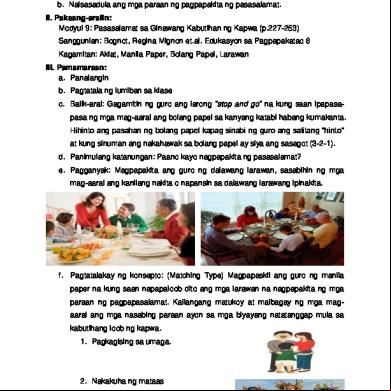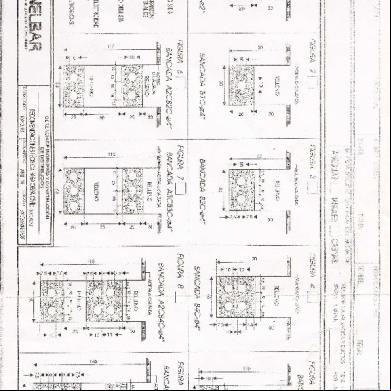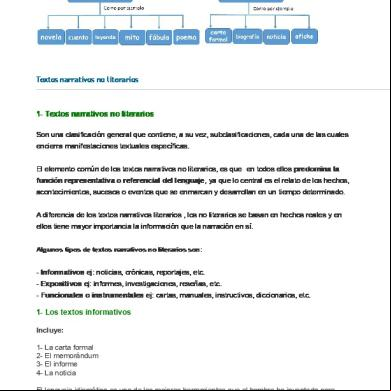Lesson 8 Edtech2 2a1e3k
This document was ed by and they confirmed that they have the permission to share it. If you are author or own the copyright of this book, please report to us by using this report form. Report l4457
Overview 6h3y3j
& View Lesson 8 Edtech2 as PDF for free.
More details h6z72
- Words: 1,308
- Pages: 6
Lesson 8 Higher Thinking Skills through IT-Based Projects Most students learn their lessons through rote or memorization with the teacher doing most of the explaining and understanding of the subject matter at hand. This kind of teaching method does not help develop the student’s thinking skills or his ability to analyze and reflect. Today, the educator realizes that students need to go outside the classroom and avail of the facilities of information technology and be on their own in their quest for information and to acquire knowledge. There is so much to be learned about ourselves, our neighbors, our environment, our world, our history and using the internet to achieve this goal is part of the integration of information technology to the educational system. Discussion: 1. Does it merely provide data or information? Yes, it provides information because according to technology.com, WebQuests are discovery learning tools; they are usually used to either begin or finish a unit of study. It is an inquiry - oriented lesson format in which most or all of the information that learners work with comes from the web. It is an inquiry - oriented activity in which most or all of the information used by students is online. By providing links necessary to complete the quest, the student is able to focus on the material rather than spend time looking for it. 2. What does WebQuest also provide? (Clue: Discovery feature of the project search, roles of each group member in the search, etc.
Web quest also provide some guidance or scaffolding on how to organize the information gathered. Web-quests can be designed to be an effective use of student time by being organized and focused on using information instead of searching for it. These two factors contribute to ensuring that students remain on task while online. Webquests extend the students' thinking to the higher levels of Bloom’s taxonomy; analysis, synthesis and evaluation. Web-quests also a variety of instructional and cognitive practices such as critical thinking and problem solving through authentic assessment, cooperative learning, scaffolding and technology integration. 3. Will WebQuest suffice in case of local/domestic problems/questions, such as the definition of “Filipino” among patriots of the 1986 Philippine revolution? Yes because when we talk of WebQuest we are also dealing with the internet, and internet provides answers to every question which comes from different nations, different people different culture and traditions. Therefore it is not impossible for WebQuest to answer local or domestic problems or questions. There are even topics that we cannot find on books but we can find it on the internet. 4. Where can we get information for local/domestic problems/questions? (Clue: a Library section for local materials) We can get information for local and domestic problems/question not only in the library section but also through the internet, information provided by the Website or through online conversation.
Educational Technology 2 Educational Technology 2 Lesson 8: Higher Thinking Skills Through IT - Based Projects Webquest 1. Does it merely provide data or information? *No, it is because,it also gives more information and help teachers too. 2. What does Webquest also provide? (Clue: discovery feature of the project search, roles of each group member in the search, etc. *The webquest also provides resources for the teacher can be used to teach their students and this allow the teachers to take better advantage of teachable moments with his students. And through this, the students are more motivated and also it develops their higher thinking skills in doing the activities that the teacher instructed. 3. Will Webquest suffice in case of local/domestic problems/questions, such as the definition of "Filipino" among patriots of the 1896 Philippine revolution? *It is yes because the webquest can be also a human tutor for which it gives up-to-date information to the learners. 4. Where can we get information for local/domestic problems/questions? (Clue: a library section for local materials) *Aside from webquest, we can also use the provincial library of the province in which you can avail more information especially information about the province that you want to.
1. Does it merely provide data or information? No. WebQuest is also a collaboration of organized ideas from teachers and students around the globe. Teachers use WebQuest as a way to make good use of internet while engaging their students in the kinds of thinking that the 21st century needs. 1. What does WebQuest also provide? (Clue: Discovery feature of the project search, roles of each group member in the search, etc.) WebQuests of either short or long duration are deliberately designed to make the best use of the learner’s time. To achieve that efficiency and clarity of purpose, WebQuests should contain at least the following parts: introduction, task, a set of information sources, description of the process, guidance and a conclusion. 1. Will WebQuest suffice in case of local/domestic problems/questions, such as the definition of “Filipino” among patriots of the 1896 Philippine revolution? No. WebQuests are only tool in teacher’s toolbox. They are not appropriate to every learning goal. In particular, they are weak in teaching factual recall, simple procedures, and definitions. WebQuest usually requires good reading skills, so, it’s not appropriate to the youngest classrooms or to students with language and reading difficulties without special design and effort.
A WebQuest is an inquiry-oriented lesson format in which most or all the information that learners work with comes from the web. These can be created using various programs, including a simple word processing document that includes links to websites.
JAN
7
Creativity of a student Lesson 6: Higher Thinking Skills Through IT-based Projects
Answer the following:
1. Should the creativity of students be recognized and approved in more simple projects (for example, producing photos with captions, caricatures on social issues, etc.?) Explain. Yes, the creativity of the students should be recognized and approved in more simple projects because their imagination in doing things to be creative starts in little things. So they need attention and recognition for the things or simple projects that they do because I believe a students imagination of being creative widens when he/she has a good facilitator and environment to be.
2. Should the aspects of expense and time be considered in creativity projects? Explain. Yes, the aspects of expense and time should be considered in creativity projects because the students should need enough time to plan on how to be creative in his/her projects but they should follow what is the instruction of the teacher about the deadline of their project to be submitted so the teacher also should give them enough time to do their projects well. For it will be a good or great output that they will submit to their teacher. In of expenses that the students should mind, they should not because being creative is not buying costly materials for your project but using your imagination of being creative to use the materials that are available in your surrounding or environment.
3. In group projects, other can ride on the creative talent of one or some in the group. How can a teacher give proper credit to the more talented/creative students in a cooperative project? Usually in a group project other would assign it to their member who is more creative than them. For me it is not the right way to just let someone in your group to do the job or work of others because it is laziness. So the teacher should give proper credits to the student who is doing his/her project in a way that the teacher will give him/her good grades in her projects even though it is a cooperative group the teacher should always be fair to his/her students. The student who is giving up hardship and his/her own talent doing his/her projects should receive proper credit.
Web quest also provide some guidance or scaffolding on how to organize the information gathered. Web-quests can be designed to be an effective use of student time by being organized and focused on using information instead of searching for it. These two factors contribute to ensuring that students remain on task while online. Webquests extend the students' thinking to the higher levels of Bloom’s taxonomy; analysis, synthesis and evaluation. Web-quests also a variety of instructional and cognitive practices such as critical thinking and problem solving through authentic assessment, cooperative learning, scaffolding and technology integration. 3. Will WebQuest suffice in case of local/domestic problems/questions, such as the definition of “Filipino” among patriots of the 1986 Philippine revolution? Yes because when we talk of WebQuest we are also dealing with the internet, and internet provides answers to every question which comes from different nations, different people different culture and traditions. Therefore it is not impossible for WebQuest to answer local or domestic problems or questions. There are even topics that we cannot find on books but we can find it on the internet. 4. Where can we get information for local/domestic problems/questions? (Clue: a Library section for local materials) We can get information for local and domestic problems/question not only in the library section but also through the internet, information provided by the Website or through online conversation.
Educational Technology 2 Educational Technology 2 Lesson 8: Higher Thinking Skills Through IT - Based Projects Webquest 1. Does it merely provide data or information? *No, it is because,it also gives more information and help teachers too. 2. What does Webquest also provide? (Clue: discovery feature of the project search, roles of each group member in the search, etc. *The webquest also provides resources for the teacher can be used to teach their students and this allow the teachers to take better advantage of teachable moments with his students. And through this, the students are more motivated and also it develops their higher thinking skills in doing the activities that the teacher instructed. 3. Will Webquest suffice in case of local/domestic problems/questions, such as the definition of "Filipino" among patriots of the 1896 Philippine revolution? *It is yes because the webquest can be also a human tutor for which it gives up-to-date information to the learners. 4. Where can we get information for local/domestic problems/questions? (Clue: a library section for local materials) *Aside from webquest, we can also use the provincial library of the province in which you can avail more information especially information about the province that you want to.
1. Does it merely provide data or information? No. WebQuest is also a collaboration of organized ideas from teachers and students around the globe. Teachers use WebQuest as a way to make good use of internet while engaging their students in the kinds of thinking that the 21st century needs. 1. What does WebQuest also provide? (Clue: Discovery feature of the project search, roles of each group member in the search, etc.) WebQuests of either short or long duration are deliberately designed to make the best use of the learner’s time. To achieve that efficiency and clarity of purpose, WebQuests should contain at least the following parts: introduction, task, a set of information sources, description of the process, guidance and a conclusion. 1. Will WebQuest suffice in case of local/domestic problems/questions, such as the definition of “Filipino” among patriots of the 1896 Philippine revolution? No. WebQuests are only tool in teacher’s toolbox. They are not appropriate to every learning goal. In particular, they are weak in teaching factual recall, simple procedures, and definitions. WebQuest usually requires good reading skills, so, it’s not appropriate to the youngest classrooms or to students with language and reading difficulties without special design and effort.
A WebQuest is an inquiry-oriented lesson format in which most or all the information that learners work with comes from the web. These can be created using various programs, including a simple word processing document that includes links to websites.
JAN
7
Creativity of a student Lesson 6: Higher Thinking Skills Through IT-based Projects
Answer the following:
1. Should the creativity of students be recognized and approved in more simple projects (for example, producing photos with captions, caricatures on social issues, etc.?) Explain. Yes, the creativity of the students should be recognized and approved in more simple projects because their imagination in doing things to be creative starts in little things. So they need attention and recognition for the things or simple projects that they do because I believe a students imagination of being creative widens when he/she has a good facilitator and environment to be.
2. Should the aspects of expense and time be considered in creativity projects? Explain. Yes, the aspects of expense and time should be considered in creativity projects because the students should need enough time to plan on how to be creative in his/her projects but they should follow what is the instruction of the teacher about the deadline of their project to be submitted so the teacher also should give them enough time to do their projects well. For it will be a good or great output that they will submit to their teacher. In of expenses that the students should mind, they should not because being creative is not buying costly materials for your project but using your imagination of being creative to use the materials that are available in your surrounding or environment.
3. In group projects, other can ride on the creative talent of one or some in the group. How can a teacher give proper credit to the more talented/creative students in a cooperative project? Usually in a group project other would assign it to their member who is more creative than them. For me it is not the right way to just let someone in your group to do the job or work of others because it is laziness. So the teacher should give proper credits to the student who is doing his/her project in a way that the teacher will give him/her good grades in her projects even though it is a cooperative group the teacher should always be fair to his/her students. The student who is giving up hardship and his/her own talent doing his/her projects should receive proper credit.










